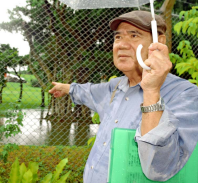“Why do we need to get permission from U.S. marines to visit our ancestors’ graves?”

Seizen Ameku pointed with his finger to his ancestors' grave within the fence of U.S. Marine Corp Air Station Futenma on April 9, Ojana, Ginowan.
April 18, Ryukyu Shimpo
On April 17, at graves within U.S. Marine Corp Air Station Futenma, Ginowan, residents held the Shimi Festival to celebrate their ancestral spirits.
After getting permission from the authorities, about 490 people visited their ancestors’ graves.
The Futenma airfield remains 20 years after the governments of Japan and the United States agreed to close it and return lands to the owners. For the annual Shimi Festival, residents have to get the permission from the U.S. Marine Corps to visit their ancestors’ graves.
Seizen Ameku, 76, and about 20 of his family members gathered at the ancestors’ grave.
Ameku revealed his mixed feelings. “We family members gathered at the grave. It was only in order to tell our ancestors what we have been doing lately. Why do we need to get the permission from the U.S. marines?” he said.
According to Ameku, when he was a child, the residents could visit the grave freely because there was no fence between the base and local residential areas.
When he came back from out of Okinawa after finishing his school life in 1960s, fences surrounded the base. The U.S. military now requires the local residents to request permission to visit the graves.
Ameku said he had been repeatedly asked to identify himself by the military officials.
One of the family members was followed by a Japanese security guard employed by the U.S. military all the way to in front of the grave from gate of the base.
“American soldiers go out and come into the base freely. Why aren’t Okinawan citizens allowed to do it?” Ameku said.
(Translation by T&CT)
Previous Article:Japan-China joint project in Okinawa aims at advancing caregiving for elderly in China
Next Article:Onaga eyes ‘dynamism’ in Asia, expecting economic exchange
[Similar Articles]
- Tomb Sweeping Festival held to wish for prosperity
- Money for the afterlife, “Uchikabi” production springs into peak production as the Okinawan shimi season kicks off
- Three humpback whales appear in Nago Bay
- During the Shimi Festival people visit tombs to pray for their family’s health
- 400 people pray for lasting peace at Shimi Festival
 Webcam(Kokusai Street)
Webcam(Kokusai Street)


